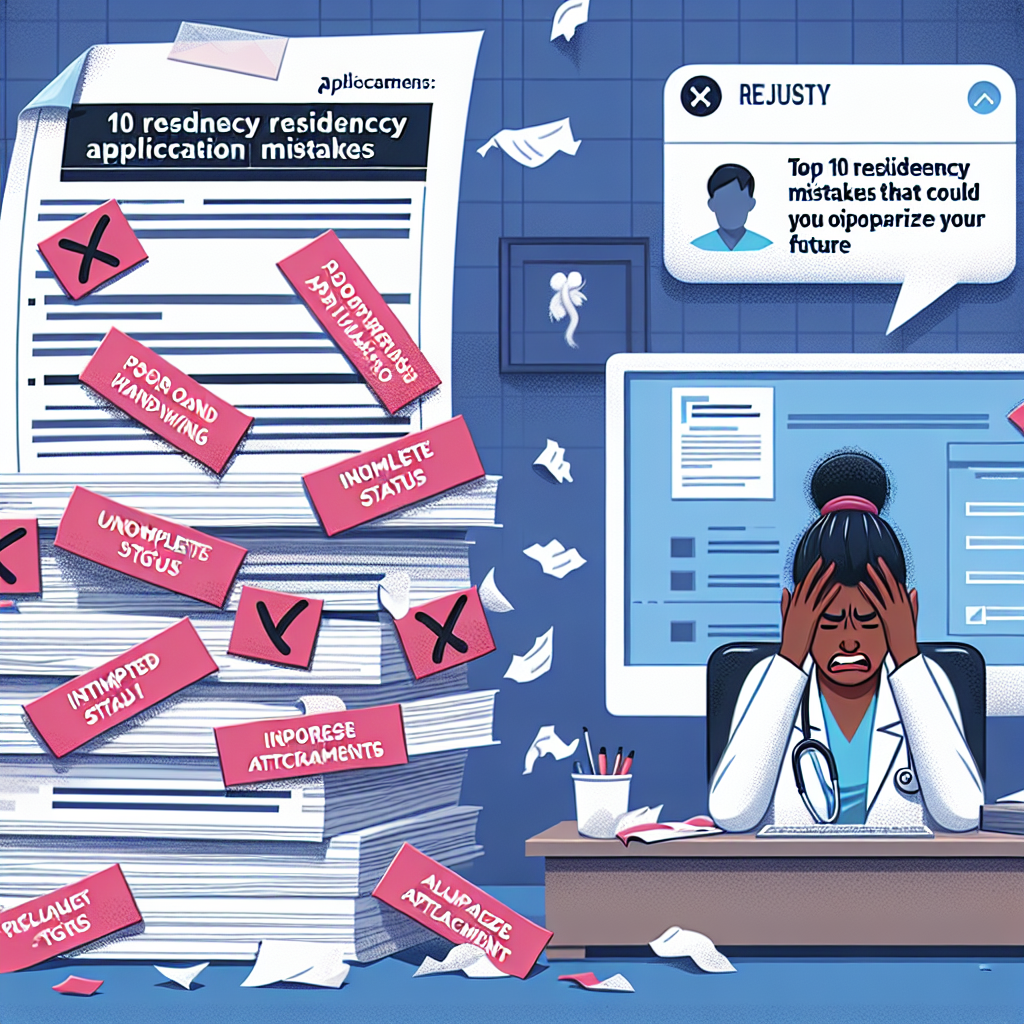Embarking on the journey toward residency can be one of the most significant milestones in your medical career. With so much at stake, it’s essential to navigate the application process with diligence and precision. Unfortunately, many applicants unknowingly sabotage their chances by making common mistakes. Here’s a detailed guide to the top 10 residency application mistakes that could jeopardize your future and how to avoid them.
1. Neglecting to Research Programs Thoroughly
Importance of Program Fit
Every residency program has its unique culture, mission, and requirements. Failing to research specific programs can lead you to apply to places that aren’t a good fit. Make sure to understand the program’s specialties, values, and what they seek in candidates. Ensure that your interests align with theirs.
Tips for Effective Research
- Visit program websites and note faculty interests.
- Reach out to current residents for insights.
- Attend residency fairs to engage with program representatives.
2. Subpar Personal Statements
The Heart of Your Application
Your personal statement is your chance to communicate your journey and aspirations. A generic, uninspired essay can leave a lukewarm impression.
Crafting a Compelling Narrative
- Start with your “why” – what drives you towards this specialty?
- Highlight unique experiences that shaped your career.
- Edit rigorously to ensure clarity and conciseness.
3. Ignoring Letters of Recommendation
The Power of a Recommendation
Strong letters of recommendation can illuminate your qualifications from a third-party perspective. Weak or generic letters can raise red flags.
Best Practices for Recommendations
- Select recommenders who know you well and can speak to your strengths.
- Provide them with your CV and personal statement to guide their letters.
- Ask well in advance, giving them ample time to write a thoughtful recommendation.
4. Poor Timing with Applications
The Dance of Deadlines
Submitting applications late is a critical mistake. Each residency program has different deadlines, and missing one could cost you an opportunity.
Staying Organized
- Use a calendar to keep track of all submission dates.
- Ensure you have a well-defined timeline that includes revision periods for application materials.
5. Overselling or Underselling Yourself
Finding the Balance
It’s essential to present yourself confidently without coming off as arrogant. Conversely, underselling can imply a lack of self-awareness or confidence.
Striking the Right Tone
- Use quantifiable achievements to demonstrate your accomplishments.
- Be sincere about your experiences, showcasing both strengths and areas for growth.
6. Neglecting “Fit” During Interviews
The Interview Dynamics
During interviews, it’s important to convey both your qualifications and your compatibility with the program. Not exhibiting a genuine interest in the program can be detrimental.
How to Show Fit
- Prepare questions that reflect your research about the program.
- Be authentic in your responses; show your personality and enthusiasm.
7. Focusing Solely on Grades
The Myth of Metrics
While good grades are important, they aren’t the only factor in residency applications. Focusing exclusively on academic performance can overshadow your other strengths.
Emphasizing Holistic Growth
- Engage in extracurricular activities, research, or volunteer work to build your profile.
- Highlight leadership roles or community service experiences in your application.
8. Not Practicing for Interviews
The Importance of Preparation
Many candidates overlook the significance of interview practice, which can lead to a lack of confidence during the actual interview.
Effective Interview Practice
- Conduct mock interviews with peers or mentors.
- Record yourself to analyze body language and communication style.
9. Overlooking Your Online Presence
Digital Footprints Matter
In today’s digital age, your online presence can be scrutinized by residency programs. Inactive or unprofessional social media profiles can negatively impact your application.
Managing Your Online Reputation
- Clean up your social media accounts; remove any questionable content.
- Consider professional platforms like LinkedIn to showcase your accomplishments.
10. Giving Up Too Soon
Persistence is Key
Residency applications are highly competitive, and rejection can be disheartening. Many brilliant candidates face setbacks before achieving their goals.
The Path Forward
- Always seek feedback on your application for improvement.
- Stay motivated and keep refining your skills and knowledge.
Conclusion
Navigating the residency application process can be daunting, but recognizing common pitfalls can empower you to present your best self. By avoiding these ten mistakes and approaching your application thoughtfully, you can set yourself up for a successful residency match and ultimately take significant steps towards your medical career. Remember, every applicant has their unique journey – embrace it, learn from it, and move forward with confidence.


